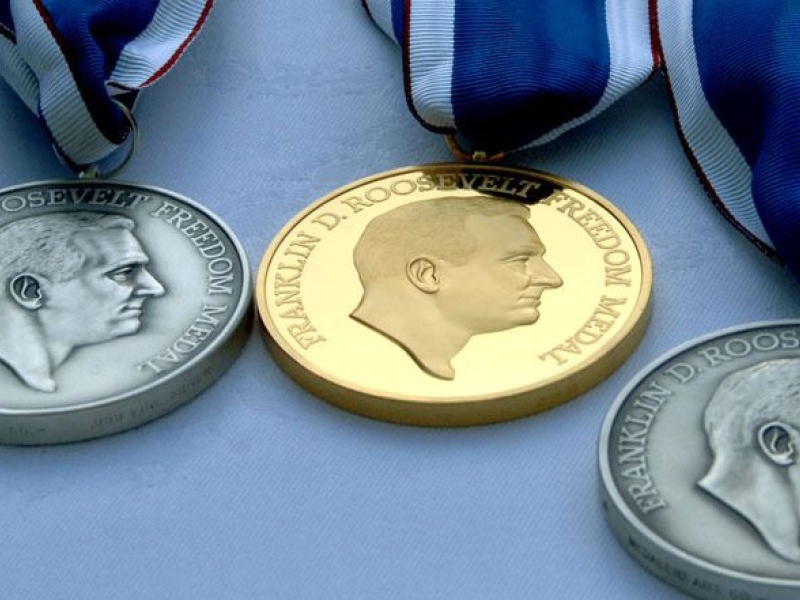By Becci Fobbe
Welcome to Freedom Week! An entire week dedicated to projects evolving around the Four Freedom Award ceremony and its side events. Honestly, in the beginning I thought this article might be superfluous due to the overwhelming amount of UCR projects relating to the notion of freedom. The Arts & Design course is exploring what freedom means, the Journalism students are busy writing feature stories about freedom and have set up a human right radio show, students from the Human Rights Law course are organizing the Local Four Freedoms, and organized an art exhibition earlier this week where refugees portrayed their own perception of this concept or helped lawyers defend clients in human rights cases. Even a capstone about the Four Freedoms and the Roosevelt family is being taught this semester by Dr. David B. Woolner, Senior Fellow and Hyde Park Resident Historian of the Franklin and Eleanor Roosevelt Institute, New York. The big umbrella overarching UCR this semester is this concept of freedom, or more specifically the four freedoms.
And with the sheer number of multi-disciplinary projects going on about them I really thought it was unnecessary to write about what the Four Freedoms are. However, when a housemate walked up to me and asked me if the Local Four Freedom ceremony that got announced in the RASA newsletter are the same as the Four Freedom ceremony, I decided to write this article after all.
While the above mentioned projects are mostly connected to UCR, or at least limited to Zeeland, there is one event this week that is without a doubt drawing the most attention: The Four Freedom ceremony. Every two years, 5 medals are given out to individuals or organizations that have done enormous work in their field. This year, the 5 medals are given to Angela Merkel (International Four Freedom Award), Mazen Darwish (Freedom of Speech), the Clergymen of the Central African Republic (Freedom of Worship), Dr. Denis Mukwege (Freedom from Want) and Human Rights Watch (Freedom from Fear). But who are these laureates?
Most well-known, and probably also most debated, is the German chancellor Angela Merkel. The Roosevelt Foundation argues that Merkel deserves this award due to her ability to manage the financial crisis of the European Union, her negotiations during the Ukraine crisis as well as her moral leadership against right-wing protest groups such as Pegida and her general governing in the still ongoing refugee crisis. However, her work has also attracted negative voices, especially of right-wing groups, who accuse Merkel of threatening the European or several national identities with her refugee policy. Especially due to recent developments in Germany regarding the journalist Böhmermann, critics who disapprove awarding Merkel increase. Merkel is said to arrive in Middelburg for only a brief period of time. All other laureates however will stay in Middelburg a while longer to talk to students.
Mazen Darwish, a Syrian journalist, will be awarded with the medal for Freedom of Speech for his courageous efforts to promote human rights and the freedom of speech in Syria. As part of his work, he published detailed reports of human rights violations done by police and security forces. He founded syriaview.net, an independent news site which got banned by the Syrian government. 4 years ago he also established the Media Club, Syria’s first magazine about media affairs. In 2012, Darwish got arrested in Syria but has since been released to accept his award.
The three clergyman of the Central African Republic were chosen to receive the Freedom of Worship award because the three committed themselves to an interfaith dialogue in a country that is suffering from heavy armed conflict. Archbishop Dieudonné Nzapalainga, Imam Omar Kobine Layama and The Rev. Nicolas Guérékoyame-Gbangou are working vigorously to strive for peace in their country, sometimes at great personal costs. Together they travel the country to promote peace and reconciliation processes and open churches and mosques to provide shelter. One of their greatest achievements is the founding of the Interfaith Peace Platform, that promotes reconciliation and dialogue among Muslims, Catholics and Protestants.
The award for Freedom from Want will be given to Dr. Denis Mukwege, a doctor from the Democratic Republic of the Congo. He founded the Panzi hospital in 1999 that treats survivors of sexual violence with physical wounds but also offers the victims legal and psychosocial help. Especially important is the reintegration of sexual violence victims to society. Additionally, Mukwege also tries to report the offenders.
The last laureate is the international human rights organization Human Rights Watch. The nomination is motivated by the dedication of the organization to defend human rights worldwide. Human Rights Watch documents human rights violations and abuses and is specifically known for its accuracy and impartial reporting. The organization raises a lot of issues in their reports and puts pressure on governments and other entities.
Due to the prominent guests of the awards (e.g. the King of the Netherlands), the ceremony on Thursday, the 21st of April, is not open to the public. However, it will be live-streamed on Dutch television.
Becci Fobbe, Class of 2016, Politics and Law Major from Büdingen, Germany.

